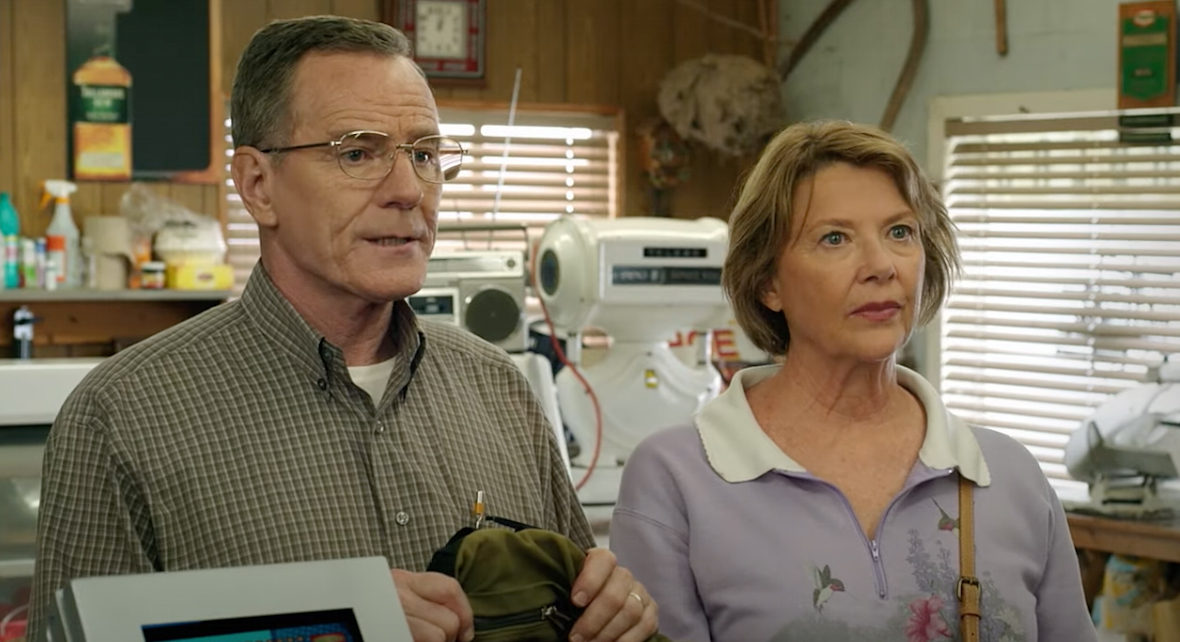Isn’t generation-baiting the best? Don’t you just feel so good knowing you’ve taken a young smart-ass down a peg or two? That’s the sad conclusion reached by Jerry and Marge Go Large, a film completely lacking in villains until they invented some know-it-all underclassman Harvard jerk.
Let me be clear, in case you’ve never gotten the message before: I don’t see any difference in the general psychological makeup among any generation. I see it just as likely that, swapping places, Millennials would have fought the Nazis while the Greatest Generation would use gender-neutral pronouns while exchanging sexts. I think generational differences, if any, are entirely environmental … and pretending that one generation “built this country” while another “doesn’t have any work ethic” is self-deluded, obstructive, and unhelpful hogwash. Tell me, old folks, do you really have a good feel for kids in school today? Did you ever have active shooter drills? Did you ever face the prospect of homeownership being beyond your reach no matter what your talent or work ethic? No? Then let’s try to avoid blanket disparagements.
Jerry (Bryan Cranston) is one of those guys who clearly doesn’t want to retire, but has to anyway. As a veteran floor manager at Kellogg’s, he’s past being “grrrrrrr-eat!” Hence, forced to find a life after work, Jerry, ironically for a mathematician, is at odds with himself until he sees an ad for the state lottery. Every three weeks or so, a certain lottery game “Winfall” takes all the excess money collected from weeks #1 and #2 and distributes it into a greater number/greater payoff of winning tickets than the previous two weeks.
Look, I know enough about math to know you never play the lottery. Never. So I personally would have enjoyed the film explaining a little better how the dump week worked, but you can’t have everything.
Oh, and this really happened, btw. The key to this all is that during dump week, the odds changed ever so slightly to favor the player. Now, I think it’s impossible to judge expected payout without knowing pot size – which in the film the players didn’t know – but that’s nitpicking. The point is Jerry is a mathematics whiz and he figured out that if he bet enough during a dump week (to adjust for bad luck), he was guaranteed to receive more than he invested. Well, well, well, a guaranteed lottery payout … what do you do with that information, huh?
Just so you know this is a movie, one of the side-effects of winning is Jerry and his wife Marge (Annette Bening) start having sex again. I mean what’s more attractive than a guy scamming the lottery, huh? Another thing – and I really hope this part is biographical – is that Jerry actually gets bored with self-enrichment and incorporates with the town. Greater sources of cash, in turn, means more likely payout. Check it out – Jerry’s scam is good for the whole town!
Jerry and Marge Go Large refused to make a villain out of the lottery system or legal enforcement. This seems amazing to me. The entire attitude of any official represented in the film is, “you figured out how to beat the system? Good for you!” This is an attitude that can only be generated among aged people of white privilege. I’m sorry, but the idea that the state lottery would realize during dump week that it was losing money and NOT ADJUST the game is ludicrous. If that’s genuine history, I’m Joan of Arc. The other part I’d attribute directly to old white men is the villain, Tyler (Uly Schlesinger), a 21-year-old Harvard student who figures out exactly what  Jerry figured out – that on certain weeks, the odds favored the not house.
Jerry figured out – that on certain weeks, the odds favored the not house.
Geez, film, does that not strike you as a bit of an inferiority complex? Your hero is a blue-collar Michigan retiree and the villain is a Harvard smartass. You’re both doing the exact same thing – manipulating a mathematical flaw in the lottery. Why wouldn’t you be allies instead of adversaries? Why not? Because otherwise there wouldn’t be a movie.
I like Bryan Cranston and Annette Bening. What’s not to like? Hmm, well their stakes are low here. Very low. And the portrayal of selfless heroism from the guy scamming the lottery is a little much. At the root, this is a get-rich-quick scheme in which you’ve forgiven those who indulge … well except for the kid you didn’t like. For a biography, the feel of the picture strikes me as more a rose-colored verisimilitude than a recreation of genuine facts. And I sure didn’t like the generation-baiting attitude. It’s a good picture to keep your MAGA-loving Uncle from spouting idiocy for 96 minutes, but I have little use for it otherwise.
There once was a mathematician named Jerry
Who solved the state lotter-rary
You’d think he’d get caught
Or put on the spot
Yet when pick came to scratch, au contraire-y
Rated PG-13, 96 Minutes
Director: David Frankel
Writer: Brad Copeland
Genre: Wasting your golden years
Type of being most likely to enjoy this film: Generation baiters
Type of being least likely to enjoy this film: I dunno, maybe, people who think gaming the system is not the best way to live life



